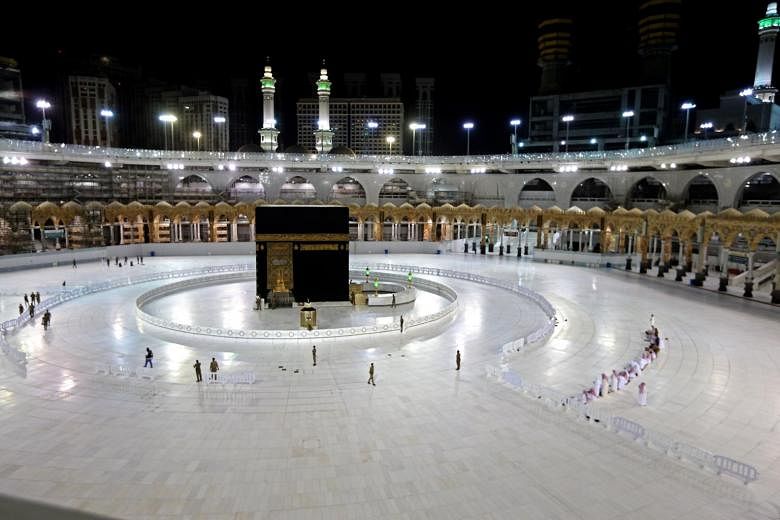JAKARTA • The holy month of Ramadan has started with Islam's holiest sites in Saudi Arabia and Jerusalem largely empty of worshippers as the coronavirus crisis forced the authorities to impose unprecedented restrictions.
During Ramadan, Muslims join their families to break fast at sunset and go to mosques to pray. But the pandemic has changed priorities, with curbs on large gatherings for prayers and public "iftars", as the meals to break fast are known.
In a rare occurrence in Islam's 1,400-year history, Mecca's Grand Mosque and the Prophet's Mosque in Medina - the religion's two holiest locations - will be closed to the public during the fasting period.
Prayers from inside the mosque at Mecca on the first evening of Ramadan on Thursday were restricted to clerics, security staff and cleaners. The ceremony was broadcast live on television.
At the near-empty Al-Aqsa Mosque in Jerusalem, an imam called out the first Friday prayers of Ramadan, his voice echoing across a windswept plateau almost devoid of worshippers.
A handful of Muslim clerics with masks knelt below the pulpit, keeping some distance apart in compliance with Covid-19 restrictions.
"We ask God to have mercy on us and all of humanity and to save us from this lethal pandemic," the imam said.
Ramadan typically draws tens of thousands of Muslims daily to the mosque and the adjoining Dome of the Rock. Worshippers will instead have to watch prayers broadcast on television.
Governments in Asian countries with large Muslim populations have urged people to keep their distance while observing their faith, amid fears the coronavirus may overwhelm often underfunded healthcare systems.
Early outbreaks in Asia, home to many of the world's 1.8 billion Muslims, were traced in some cases to pilgrims returning from Iran and Saudi Arabia to Afghanistan and Pakistan, or to gatherings of Islamic groups in India and Malaysia.
The restrictions have put a damper on spirits in Indonesia, the world's biggest Muslim-majority nation, where national religious organisations have called on the faithful to stay at home.
On the island of Java, Mr Tatan Agustustani, 52, and his family were busy clearing furniture from their lounge to make way for prayer mats.
"For me, no matter where we are, prayers must go on, even though we cannot pray in the mosque," said Mr Agustustani.
But that message appeared lost in Aceh province - where Syariah laws apply - as worshippers crowded into a mosque for tarawih prayers on the eve of Ramadan.
"In our belief, it is God who decides when we will die," said devotee Taufik Kelana. "But we will stay alert, like wearing a mask."
Leaders of India's 160 million Muslims have urged people to heed the nationwide lockdown throughout the month. The All India Islamic Centre of religious teaching will livestream recitation of two chapters of the Quran, the Muslim holy book, from 8pm to 10pm each day.
In Pakistan, doctors are worried about the government's decision to lift curbs on mosque congregations for Ramadan.
Bangladesh has ordered mosques to restrict evening prayers to 12 people and banned iftar gatherings - a move criticised by the fundamentalist Hefazat-e-Islam group.
Meanwhile, Sri Lanka has closed mosques to the public.
REUTERS, AGENCE FRANCE-PRESSE











